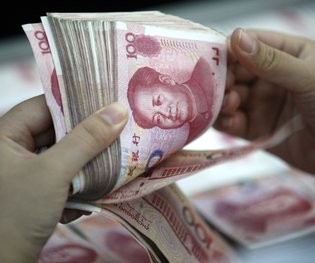(VOVworld) – The International Monetary Fund has decided to include the Chinese Yuan in the Special Drawing Rights basket (SDR). The Yuan has become the 5th currency in SDR together with the US dollar, the euro, the sterling pound, and the Japanese yen. The move will help pave the way for broader use of the yuan in the global financial system.

Chinese yuan has gained a benchmark status |
The IMF said the yuan has met its requirements of freely floating and being widely used to make payments for international transactions. The decision will come into effect on October 1, 2016. This has been the first SDR change since 1999.
The IMF re-assesses the SDR basket every 5 years. In 2010, the IMF rejected including the yuan in the SDR basket because it failed to meet essential requirements. In the latest assessment, 70% of the IMF Directorate agreed to grant the yuan reserve-currency status which accounts for 10.92% of the SDR basket, higher than the ratio of the British pound and the Japanese yen.
China has long believed that its economy and the yuan are strong enough to be included in the SDR. But China’s effort to globalize its currency experienced a bumpy ride. China has used the yuan to buy IMF bonds worth 50 billion USD since 2009, but very few transactions between China and other countries have used the yuan. Countries could neither use the yuan to import goods from a third country nor pay off a foreign bank or a foreign bond investor. Bonds in yuan are only sold in China by Chinese banks or a few multilateral financial institutions.
Aiming to globalize the yuan and reduce dependence on the US dollar, China has reformed its financial market, particularly in recent months, by opening its monetary market to foreign investors and giving up some of its tight control over the currency. In August, China shook global markets by abrupt devaluation of the yuan. The IMF decision is seen as China’s final victory.
Experts say the yuan’s admission to the SDR will not have a strong impact on global demand for the yuan in the short term, because investors have cautiously watched whether China will fully liberalize resources and float the yuan. But in the long term, demand for the yuan will increase and central banks and foreign investment funds will adjust their currency reserve portfolios.
The IMF’s decision was a turning point in China’s global financial integration. It came 3 days after the Russian Central Bank included the Chinese yuan in its reserve currency basket. With this success and the establishment of the Asian Infrastructure Investment Bank (AIIB), China is expanding its influence in the global financial system.